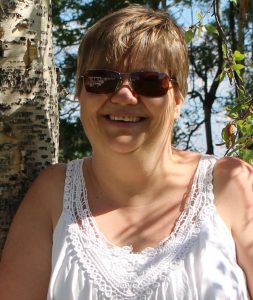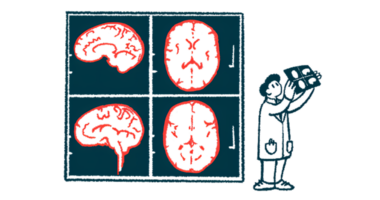‘I am Cured,’ Says Woman with Aggressive Form of MS After Receiving HSCT in Canada

An entry in the comments section of Multiple Sclerosis News Today caught my attention a couple of weeks ago, and peaked my interest. It was a personal tale of one woman’s journey from being paralyzed and told that her condition was “between you and God” to being able to walk again, thanks to HSCT. It read:
I must say from a patient’s perspective that I was the fourth [MS patient given HSCT] outside of the Canadian Trial done with Dr. Mark Freedman and Dr. Harold Atkins.
My life is spectacularly different than before my transplant… I, at my worst, was 9.5 in our EDSS scale of disability. I was sent home to my small town hospital, in Blairmore, AB [Alberta], after the city had done all they were able, to die… I was told it was now ‘between you and God,’ is this what I wanted to hear? Well, at that point ‘kind of so!’ I had been a quadriplegic already with no movement but my head, was this my life until God chose to take me? If it was going to be, death was a great option.
Things instead took an amazing turn and here I am nearing on five years’ post-transplant. I’m alive and well. ‘Well,’ of course, from my perspective — I’m not dead… I have the ability to roll myself in bed, I can feed myself and walk aided, probably always will, but I’m nowhere near where I was before.
My disease has been HALTED!!! I do use the “C word” all the time… I actually named one of my blogs the “C WORD” stands for “Cured not cancer.” I’m so grateful for all those who came before me and excited beyond measure for all those to follow…
That was written by Fiona Fifield, who I contacted at her home outside Calgary, Canada.

Fiona Fifield
I asked her to tell me her story, and how she became one of the few people to have received HSCT in Canada outside the trial conducted by Dr. Mark Freedman and Dr. Harold Adkins, of The Ottawa Hospital and the University of Ottawa. (Watch Multiple Sclerosis News Today‘s exclusive interview with Dr. Mark Freedman at this year’s CMSC.)
She said: “It was in January 2010, when I was working as a long-haul truck driver, that I realized that I could not work anymore.
“One day in April 2011, I woke up paralyzed from breastbone down. I was taken to hospital in Calgary where, just three days later, the paralysis got worse, it was then up to collarbone. Despite various tests and diagnosis with MS, doctors could not do anything and so I was transferred to my local hospital in Blairmore, not for treatment but to die. In June 2011 I was on my deathbed. My mom and sister also have MS and my situation was so bad that mom and dad were planning my funeral,” she said.
Turning point
“One of mom’s friends, Anne, had just restarted an MS support group in Blairmore hospital. I went along and that was the turning point in my life. I sat down with Anne this day and told her of my diagnosis of Marburg variant, which in all her 25 years with the MS Society had never heard of.”
Later in June, Anne, of the Lethbridge Chapter of the MS Society, and a friend from the Red Deer Chapter, Lorraine, flew to Montreal to attend a presentation by Dr. Freedman about the completed HSCT trial.
Fiona continued: “At the end of his presentation, Dr. Freedman told his audience that treatment was only available for patients who had a malignant form of MS, known as Marburg’s variant. This is a rapidly progressive and malignant form of multiple sclerosis that usually leads to severe disability or death within weeks to months without remission. This is what I had.
“Anne wanted to talk to Dr. Freedman about me but once the presentation was over, he left by one door while Lorraine, Anne, and the remainder of the audience had to leave by a different exit.
“That evening, the two of them were making their way to a concert and had to stop at a Don’t Walk sign when Dr. Freedman walked up. Anne is not slow into coming forward, so she told him about me. He listened and asked for my papers to be sent to him.
“That led to me traveling to Ottawa in July [2011], where I was told by Dr. Freedman ,‘You are lucky to be the sickest of the sick.’ We at this point flew back home, until we were booked in at the end of August to see [the] hematologist, Dr. Adkins. It was at this juncture that there was a major twist in the program. In the month and a half between visits to Ottawa, I was already back in my wheelchair paralyzed again. They wouldn’t do my transplant unless I was able to walk 100 meters.
“I was then kept in Ottawa, as they knew if I were to return home I would never survive. I was then put on another stronger chemotherapy drug to lower my my immune system once more to getting me walking again, so between [the] August landing and the start of my procedure was a lot more effort yet. We ended up spending eight full months in Ottawa,” she said.
So, how are things going?
“One day, I woke and had never felt so good. This was just a few days after my cells had been implanted. I said ‘I don’t have MS anymore.’ I felt like my old self but it was just that one day,” Fiona said.
“I had physiotherapy and worked hard. We arrived home on April 12, 2012. At home, my partner got me a dog, to make me go outside. Using my walker, I took my beagle out every day. Initially, it was very tiring but it got easier. Then I hired a personal trainer, I fought and fought.
First steps
“I remember first walking with hands in my pockets, climbing a flight of steps for the first time. Sadly, my paralysis comes and goes, but regular physiotherapy twice a week and symptomatic medications help a lot.
“On the EDSS scale, I have improved from 8.5 to 6.0 or 6.5 now. I walk now mostly unaided, but use trekking poles to walk a kilometer,” she said.
Does Fiona think that HSCT is a cure for MS?
There was no hint of any hesitation in her reply: “Oh, yes, absolutely. I am cured of my malignant MS, I would not be here today if I hadn’t had HSCT. When you have a malignant form of MS, like me, it halts the disease even if it cannot repair all the damage. Certain things are better. I had optic neuritis in both eyes, but my eye doctor says both eyes are now clear and that there is not even a scar. And MRI scans show no active disease.”
How does she feel about MS?
“The disease has enabled me to learn about who I am and who people are; I am grateful for what I have been given. Nobody knows what is going to happen to me. So far, I have been given four years I wouldn’t have had. I’ve had friendships that I wouldn’t have ever made.
“I never have the right to be ungrateful,” Fiona said, adding: “I have always done by utmost best not to let my health rule my life; I am not my body.”
Fiona has written a book, “Fiona’s Fight,” about her story.
Note: Multiple Sclerosis News Today is strictly a news and information website about the disease. It does not provide medical advice, diagnosis, or treatment. This content is not intended to be a substitute for professional medical advice, diagnosis, or treatment. Always seek the advice of your physician or other qualified health provider with any questions you may have regarding a medical condition. Never disregard professional medical advice or delay in seeking it because of something you have read on this website. The opinions expressed in this column are not those of Multiple Sclerosis News Today, or its parent company, Bionews Services, and are intended to spark discussion about issues pertaining to Multiple Sclerosis.







Michael edwards
Thankyou ian franks for keeping on finding these people and there jorneys to h.s.c.t i think that health services world wide will have a big lawsuit on their hands one day as big as the ppi scandle for denying people the right to this treatment.
Janet
I second that and would join the class action. Too bad after 30 years with MS I have to work on a fundraiser plus still work both my jobs while ill to obtain the funds to get this kind of treatment. Have I not fought enough? I am thrilled, hopeful and elated at how many have been able to obtain the treatment and get significantly better. We all deserve this.
Rach Chippendale
Marburg is the rarest and most frightening and destructive form of M.S. My Neurologist told me that they generally see only 2 or 3 patients with this in a lifetime. To read that a patients with Marburg's has been treated with HSCT, and that it has been such a success is truly magnificent! Her words have brought tears to my eyes and i am so thrilled for her and wish her the very best on her continuing journey.
Marie Sacco
Dear Ian ????????& Fiona ????????,
I have MS disease from a traumatic fall in 2003, which happen on a black icy walkway at work. I hit my head {brain lesions}, spine {herniated discs, etc.}, have right foot drop, numbness to all my right fingers/thumb, and to the bottoms of both my feet. I have very bad balance issues. My eyesight is excellent. I use a rolling walker to get around inside and outside my home.
O.M.G., I was very unaware of this destructive form of multiple sclerosis! I truly wish the best for Fiona with this HSCT Treatment. I want to thank Ian & Fiona for updating us on what is going on internationally with these Multiple Sclerosis treatments, that are available outside my country of the USA.
As a multiple sclerosis individual in the USA, I am looking out of my country, to get the most update best medical treatments for this horrendous disease. I was wondering Ian, if you know more about the kind of MS treatment that Jack Osbourne received in Germany? It seems to be on the hush, hush classification! Thank you for your time and consideration in this matter.
Sincerely,
Marie ????????
Hello Marie, thank you for commenting. I have not looked into Jack Osbourne's treatment and I cannot advise you on a suitable treatment but, if you haved decided on HSCT, there are many places that offer what you seek. As you are online, I recommend you join some of the HSCT groups on Facebook. There you will be able to obtain the information you need from people who have undergone the transplant therapy.
Marie Sacco
Dearest Ian,
I thank you for your fast reply & I will check into this HSCT Treatment with the groups on Facebook. It was a pleasure to hear back from you!
Sincerely,
Marie
TimothySSchmitz
Growing
I've been straggling on starting my first marijuana plant I have no idea that planting would be this complicated, a lot of things to consider. I'm trying to grow this I decided to grow my own just for personal use and it's been very effective on treating my chronic back pain
lerroywick
Cannabis and tea
Cannabis infused tea are also effective specially when it comes to intestinal problems unlike smoking’s quick reaction time, cannabis-infused teas have a longer build due to the digestive tract’s absorption of the liquid’s active ingredients. It is beneficial on treating chronic illnesses like this mango. It has a lot of medical uses specially on some chronic illnesses and helps relieves pain and mood swings